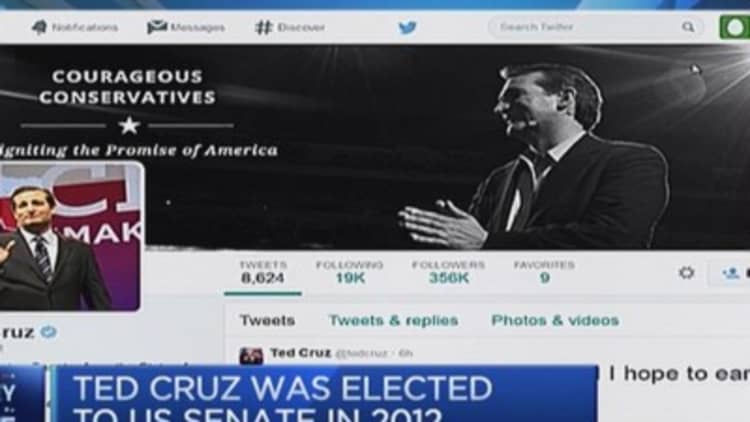Ted Cruz's entry into the presidential race should be cause for celebration among advisors and friends of former Florida Gov. Jeb Bush.
Instead of pressuring Bush to move further right toward Cruz's positions on immigration, education and fiscal policy, the entry of the firebrand Texas senator into the 2016 presidential race will do the exact opposite.
Cruz's supporters were never going to back Bush, who supports a path to citizenship for undocumented immigrants and national education standards. But many of them might also support Kentucky Sen. Rand Paul, former Arkansas governor Mike Huckabee or other more conservative candidates who could get into the GOP presidential race.
Cruz does not align exactly with any of these candidates. He is more tea party and less libertarian than Paul. And he is making a big push for evangelical voters. But there is much more overlap than with Bush, who is running in the centrist, Wall Street-friendly establishment lane of the GOP, which in recent cycles has reliably produced the eventual nominee.
What first mover Ted Cruz will mean for the race
Cruz's entry makes it less likely that any alternative to Bush will come to dominate early in the nominating process. Instead, Cruz, Paul and others will likely split up the hard-right conservative vote in Iowa, giving the eventual winner something less than a clear mandate as the leading non-Bush candidate. Bush would then hope to win New Hampshire, come in at least third in South Carolina and then use his expected vast money advantage to roll up delegates—including in his native Florida—when the race goes national in March.
Bush's main concern is not Cruz or Paul—though he will want to maintain viability with social conservatives and libertarians—but rather with Wisconsin Gov. Scott Walker and possibly Florida Sen. Marco Rubio. Both Walker and Rubio are making plays for establishment support, and Bush's big fundraising effort is in part designed to lock up that lane before his would-be challengers can get a foothold.
There is another element to Cruz's candidacy that could work to Bush's advantage.
The Texas senator in his initial campaign manifesto cited his support for the 2013 shutdown and his hard line in recent debt ceiling fights as a credential in the "Jobs and Opportunity" section.
Cruz wrote that he "[d]emanded a 60-vote threshold vote on a clean debt-ceiling increase in February 2013, when Republican leadership wanted to allow the Democrats to raise the limit with a simple majority vote." He also "[i]nsisted on a commitment from Democrats and Republicans in the Senate that the debt ceiling would not be increased as part of a deal to pass the budget."

Many Republicans view Cruz's fiscal brinkmanship as damaging to the party and done exclusively to promote his own brand. And economists generally agree that fiscal fights like the ones Cruz promotes tend to hurt business and consumer confidence and lead to fewer jobs and slower growth. Wall Street is only likely to push more money Bush's way with Cruz in the race.
Bush will now be able to use Cruz's record—in debates and on the stump—to argue for a different approach, one that seeks to apply adult leadership to Washington in ways that deliver on conservative fiscal promises on long-term deficit reduction and tax relief without governing by crisis.
Read More Why Hillary needs to announce now
That approach won't help him with staunch tea party activists who applaud Cruz's confrontational approach. But it's likely to boost Bush with segments of the GOP electorate who desperately want a candidate who can beat Hillary Clinton in the general election and return the GOP a true governing party capable of winning at the national level.
Cruz will certainly hammer Bush on Common Core education standards and immigration policy. But Bush's whole campaign approach is to explain why his policies on those issues are the correct ones to win a general election and create faster economic growth. Cruz could wind up splitting the anti-Bush vote and giving the former Florida governor clear opportunities to articulate why his message should not be frightening to the party's conservative wing.
—Ben White is Politico's chief economic correspondent and a CNBC contributor. He also authors the daily tip sheet Politico Morning Money [politico.com/morningmoney]. Follow him on Twitter @morningmoneyben.


